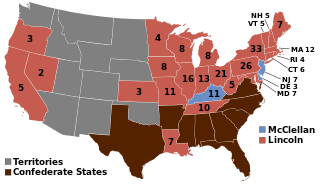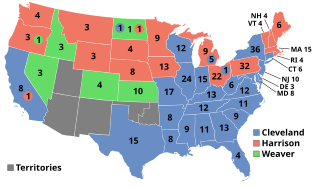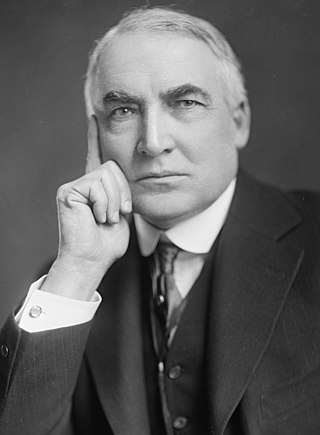
Presidential elections were held in the United States from October 30 to December 2, 1812. In the shadow of the War of 1812, incumbent Democratic-Republican President James Madison defeated DeWitt Clinton, the lieutenant governor of New York and mayor of New York City, who drew support from dissident Democratic-Republicans in the North as well as Federalists. It was the first presidential election to be held during a major war involving the United States.

Presidential elections were held in the United States from October 26 to December 2, 1824. Andrew Jackson, John Quincy Adams, Henry Clay and William Crawford were the primary contenders for the presidency. The result of the election was inconclusive, as no candidate won a majority of the electoral vote. In the election for vice president, John C. Calhoun was elected with a comfortable majority of the vote. Because none of the candidates for president garnered an electoral vote majority, the U.S. House of Representatives, under the provisions of the Twelfth Amendment, held a contingent election. On February 9, 1825, the House voted to elect John Quincy Adams as president, ultimately giving the election to him.

Presidential elections were held in the United States from November 2 to December 5, 1832. Incumbent president Andrew Jackson, candidate of the Democratic Party, defeated Henry Clay, candidate of the National Republican Party.

Presidential elections were held in the United States on November 8, 1864, near the end of the American Civil War. Incumbent President Abraham Lincoln of the National Union Party easily defeated the Democratic nominee, former General George B. McClellan, by a wide margin of 212–21 in the electoral college, with 55% of the popular vote. For the election, the Republican Party and some Democrats created the National Union Party, especially to attract War Democrats.

Presidential elections were held in the United States on November 5, 1872. Incumbent President Ulysses S. Grant, the Republican nominee, easily defeated Democratic-endorsed Liberal Republican nominee Horace Greeley.

Presidential elections were held in the United States on November 4, 1884. Democratic Governor Grover Cleveland of New York narrowly defeated Republican James G. Blaine of Maine. It was set apart by mudslinging and personal allegations that eclipsed substantive issues, such as civil administration change. Cleveland was the first Democrat elected president of the United States since James Buchanan in 1856, the first to hold office since Andrew Johnson left the White House in 1869, and the last to hold office until Woodrow Wilson, who began his first term in 1913. For this reason, 1884 is a significant election in U.S. political history, marking an interruption in the era when Republicans largely controlled the presidency between Reconstruction and the Great Depression.

Presidential elections were held in the United States on November 6, 1888. Republican nominee Benjamin Harrison, a former U.S. senator from Indiana, defeated incumbent Democratic President Grover Cleveland of New York. It was the third of five U.S. presidential elections in which the winner did not win the national popular vote, which would not occur again until the 2000 US presidential election. Cleveland was the last incumbent Democratic president to lose reelection until Jimmy Carter in 1980.

Presidential elections were held in the United States on November 8, 1892. In the fourth rematch in American history, the Democratic nominee, former president Grover Cleveland, defeated the incumbent Republican President Benjamin Harrison. Cleveland's victory made him the first president in American history to be elected to a non-consecutive second term, a feat not repeated until Donald Trump was elected in 2024. The 1892 election saw the incumbent White House party defeated in three consecutive elections, which did not occur again until 2024.

Presidential elections were held in the United States on November 8, 1904. Incumbent Republican president Theodore Roosevelt defeated the conservative Democratic nominee, Alton B. Parker. Roosevelt's victory made him the first president who ascended to the presidency upon the death of his predecessor to win a full term in his own right. This was also the second presidential election in which both major party candidates were registered in the same home state; the others have been in 1860, 1920, 1940, 1944, and 2016.

Presidential elections were held in the United States on November 2, 1920. Republican senator Warren G. Harding of Ohio defeated Democratic governor James M. Cox of Ohio. It was the first election held after the end of the First World War, and the first election after the ratification of the Nineteenth Amendment which gave equal votes to men and women. It was the third presidential election in which both major party candidates were registered in the same home state, and the last time that the state was not New York. It was the first presidential election to have its results broadcast by radio. Coincidentally, the election was held on Harding's 55th birthday.

The 1938 United States Senate elections occurred in the middle of Franklin D. Roosevelt's second term. The 32 seats of Class 3 were contested in regular elections, and special elections were held to fill vacancies. The Republicans gained eight seats from the Democrats, though this occurred after multiple Democratic gains since the 1932 election, leading to the Democrats retaining a commanding lead over the Republicans with more than two-thirds of the legislative chamber.

A member of the Legislative Assembly (MLA) is a representative elected by the voters of an electoral district (constituency) to the legislature of State government in the Indian system of government. From each constituency, the people elect one representative who then becomes a member of the Legislative Assembly (MLA). Each state has between seven and nine MLAs for every Member of Parliament (MP) that it has in the Lok Sabha, the lower house of India's bicameral parliament. There are also members in three unicameral legislatures in Union Territories: the Delhi Legislative Assembly, Jammu and Kashmir Legislative Assembly and the Puducherry Legislative Assembly. Only a Member of the Legislative Assembly can work as a minister for more than 6 months. If a non-Member of the Legislative Assembly becomes a Chief Minister or a minister, he must become an MLA within 6 months to continue in the job. Only a Member of the Legislative Assembly can become the Speaker of the Legislature.
The Administrative Panel is one of five vocational panels which together elect 43 of the 60 members of Seanad Éireann, the senate of the Oireachtas. The Administrative Panel elects seven senators.
The Agricultural Panel is one of five vocational panels which together elect 43 of the 60 members of Seanad Éireann, the senate of the Oireachtas. The Agricultural Panel elects eleven senators.

Elections to Newham London Borough Council in London, England was held on 6 May 2010. This was on the same day as other local elections and the general election to the UK Parliament.

The 1886–87 United States Senate elections were held on various dates in various states. As these U.S. Senate elections were prior to the ratification of the Seventeenth Amendment in 1913, senators were chosen by state legislatures. Senators were elected over a wide range of time throughout 1886 and 1887, and a seat may have been filled months late or remained vacant due to legislative deadlock. In these elections, terms were up for the senators in Class 1.

The 2014 Newham London Borough Council election took place on 22 May 2014 to elect members of Newham London Borough Council in England. This was on the same day as other local elections.

The 2018 Massachusetts general election was held on November 6, 2018, throughout Massachusetts. Primary elections took place on September 4. Early voting took place from October 22 through November 2.

The 2022 Camden London Borough Council election took place on 5 May 2022. All 55 members of Camden London Borough Council were elected. The elections took place alongside local elections in the other London boroughs and elections to local authorities across the United Kingdom.
















